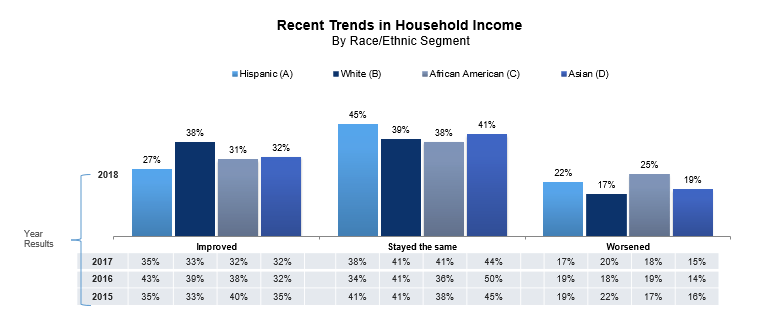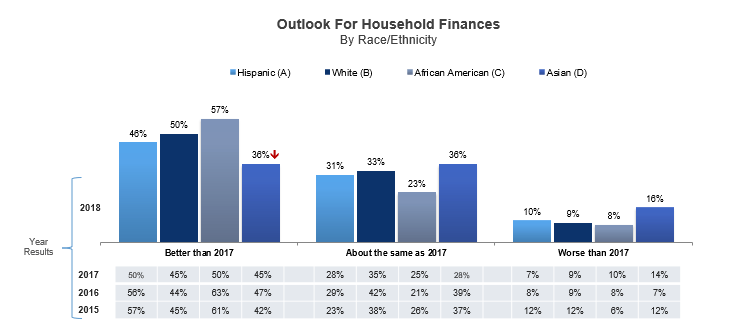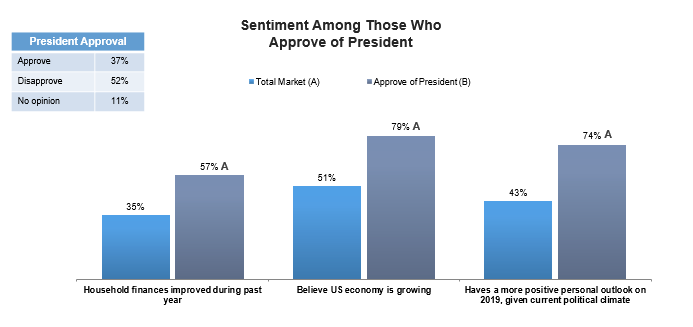A Nation Divided: 2019 ThinkNow Pulse™ Reveals Economic Outlook Differs Vastly By Ethnicity And Race
Insights from the 2019 ThinkNow™ Pulse survey are timely as we embark upon another year of projected growth for the U.S. economy. All key economic indicators point in the right direction suggesting that the Total Market’s economic outlook remains relatively stable when compared to prior years. However, at the micro level, this optimism fades. The familiar adage “a nation divided” pierces the heart of our data, revealing a country that has significantly different views on what to expect this upcoming year.
Household Finances: Consistently Stable For Total Market
Thirty-five percent of the Total Market stated that their household financial situation has improved, a small 2-point jump from 2017. Similarly, 39% of the Total Market stated their financial situation had stayed the same, a small 2-point decrease from 2017. The percentage of people stating their financial situation has worsened remained stagnant at 19% from 2017 to 2018.
Household Income Among African-Americans and Hispanics Declines
Non-Hispanic whites are the most likely to say their financial situation improved in 2018 while African-American respondents were mostly likely to state that their financial situation worsened.
The share of Hispanics who indicated that their financial situation improved in 2018 dropped significantly from 2017, then reported at 35%. Now, only 27% of Hispanics are stating that their financial situation improved.
Asian households’ financial situation has stayed relatively stable from 2017 to 2018 with a slight increase of respondents stating their financial position worsened, 19% in 2018 vs. 15% in 2017.
Personal Finances: Total Market Optimism Remains Stable
Attitudes among the Total Market have changed very little over the past two years. Thirty-two percent of respondents think their personal finances will be about the same as in 2018. That represents about the same percentage of respondents that thought their finances in 2018 would be the same as 2017.
Forty-eight percent of the Total Market thinks that their personal finances in 2019 will be better than 2018, a 2-point lift from years 2017 and 2018. Ten percent of the Total Market believe that their personal finances in 2019 will be worse than 2018, a one-point increase from 9% during the same period.
While the Total Market outlook for 2019 is relatively stable in relation to last year, optimism varies among minorities.
African-Americans most optimistic, Asian-Americans least optimistic
At 57%, African-Americans are the most likely to state that their personal finances will be better in 2019 vs. 2018. They are followed by whites at 50%, Hispanics at 46%, and then Asians at 36%.
Asian-Americans are the least optimistic regarding their finances in 2019 with 16% reporting that they think their personal finances will be worse than in 2018. This is double the percentage of African-Americans who agree with this sentiment (8%).
Major Purchases: African-Americans Will Spend More in 2019
African-Americans are driving many of the major purchases planned for 2019.
Homes and Vehicles Top of the List For African-Americans
Almost 30% of African-Americans are planning to purchase a home or condominium in 2019. At 25%, Asians are the second most likely to buy a home or condominium in 2019.
Forty-six percent of African-Americans are planning to purchase a new car or truck with Hispanics not far behind at 42%.
African-Americans also outpace all other groups in their intentions to purchase new technology in 2019. Forty-two percent of respondents are planning to purchase new home electronics such as a flat screen TV, home theater system or game console. The second highest groups are Hispanics and Asians at 36%.
Trump Approval Rating: Consistent With National Polls
Large Disparities In Approval Ratings Among Racial/Ethnic Segments
According to our study, Trump’s approval rating among the Total Market is at 37%. The national approval rating according to FiveThirtyEight is 41%, making our poll within the statistical range. When looking at the ethnic cohorts, we see that almost 50% of whites (48%) approve of Donald Trump and Asians come in second at 32%. But there is a significant drop in approval among minorities. Only 21% of Hispanics approve of Trump and only 16% of African-Americans.
The Trump Effect
Respondents Who Approve Of Trump Are More Optimistic Across Key Measures
Looking at respondents who approve of Trump, we see an interesting pattern emerge. When asked about their household financial situation this year vs. last, respondents that approve of Trump were significantly more likely than the Total Market to say that their financial situation has improved, 57% vs. 35%.
When asked to think about America’s economy today, respondents that approve of Trump are significantly more likely to say that the economy is growing, 79%, vs. the Total Market at 51%.
Lastly, when asked what effect the current political climate has on their personal outlook for 2019, Trump supporters are significantly more likely to say that they feel much more or somewhat more optimistic, 74% vs. 43% of the Total Market.
Cultural Divide
While the Total Market is cautiously optimistic, the data suggest that ethnic populations feel less secure with their place in society and their ability to improve their economic status. While African-Americans are the most optimistic, they least identify with the “new America” as reflected in the president’s approval rating. Culturally, a deep reliance on faith and community will continue to fuel optimism among marginalized cohorts, but the decline in optimism from prior years suggests that the divide remains, and the gap widens.


